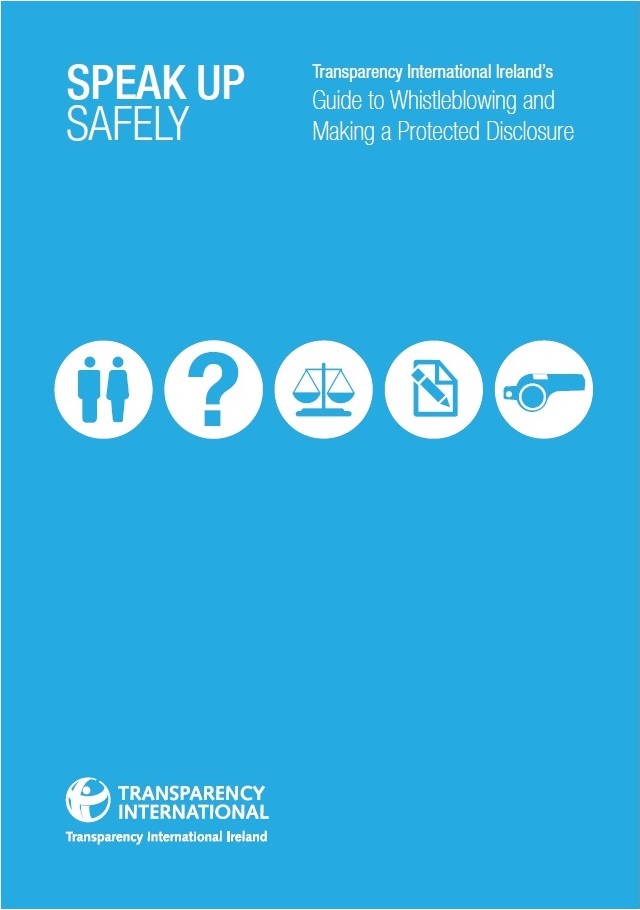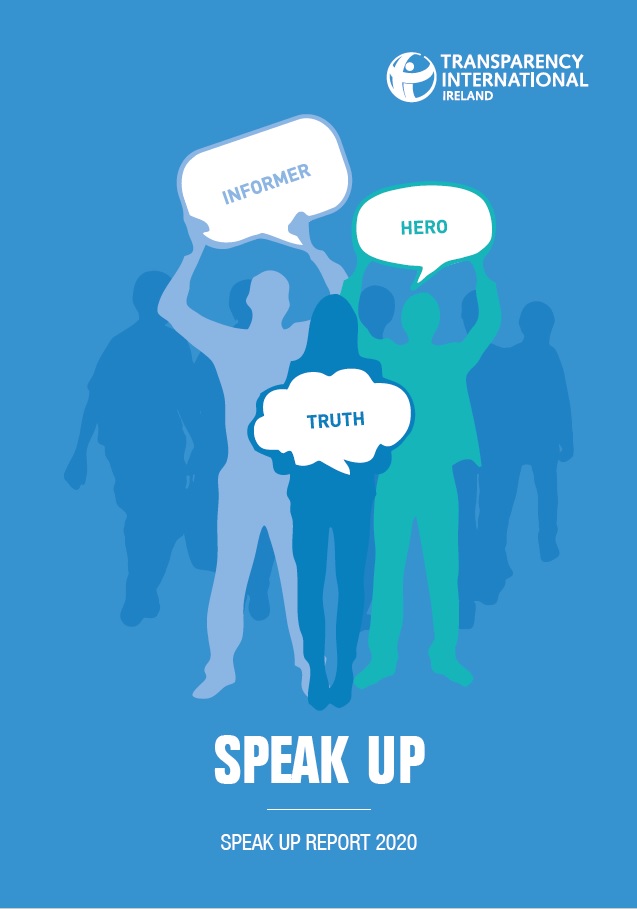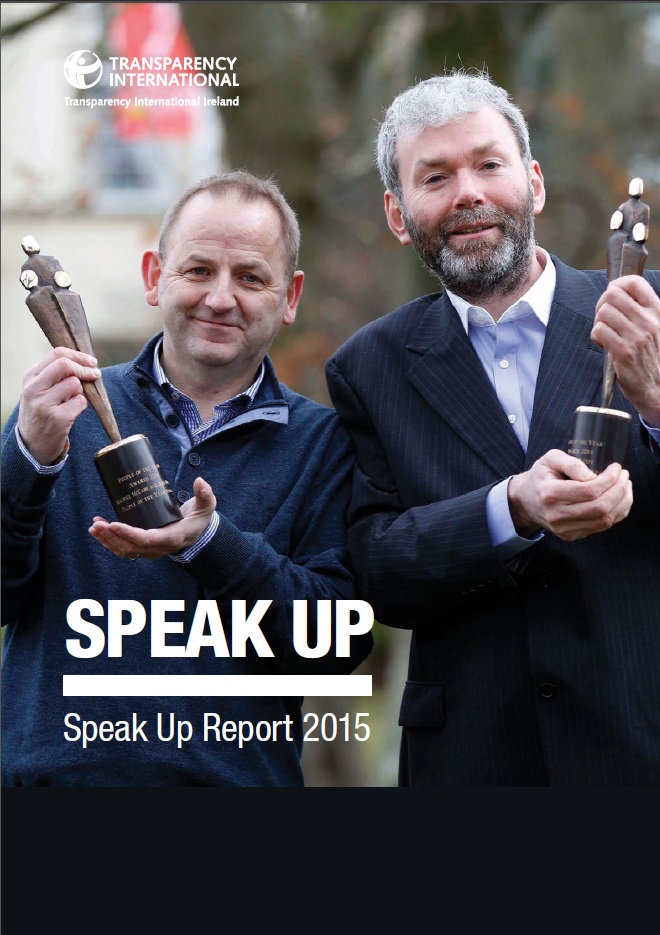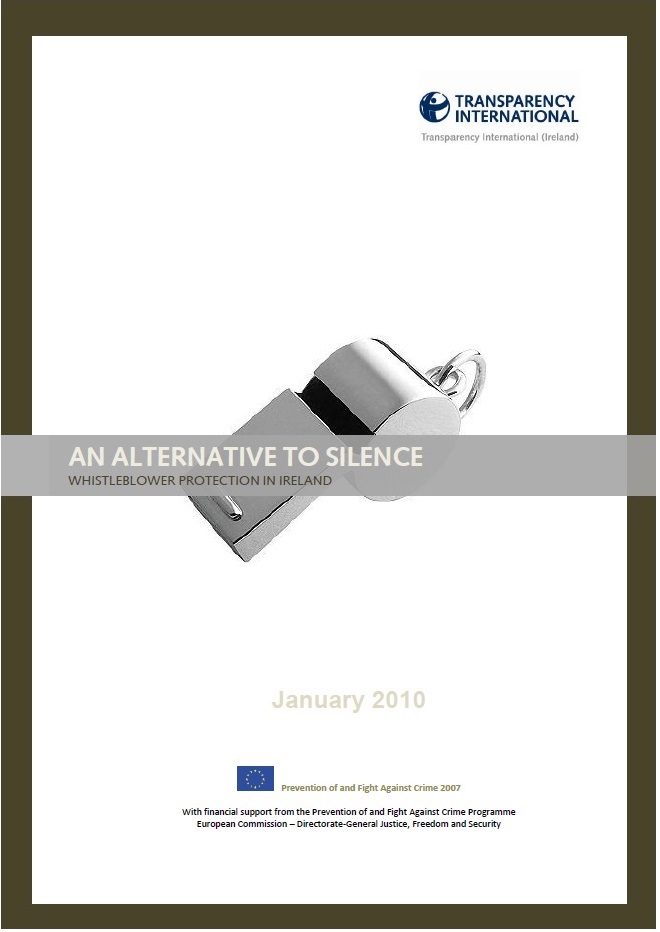Whistleblowing is acknowledged as one of the most effective ways of stopping wrongdoing. For example, many of the cases of corruption, fraud, and sexual abuse of children that we know about have been exposed by workers who reported these issues to their employers, regulators or the press. In fact, it is believed that more cases of fraud and corruption are exposed by whistleblowers than any actor – including the police or the media.
TI Ireland has published a range of resources on whistleblowing:
Guidance
Speak Up Safely Guide
Numerous employers now encourage speaking up in the workplace. They recognise the benefits of being made aware of wrongdoing within their organisation at an early stage, as this gives them the opportunity to address problems at an early stage, before it can lead to loss of standards, reputation, profit, stakeholders and customers. Whistleblowing can also reduce the commercial costs of fraudulent activities.
 Nonetheless, deciding to speak up, report a concern or ‘blow the whistle’ can be a life changing experience. Many workers who have shared concerns about wrongdoing in the workplace have since lost their jobs or opportunities for promotion, have been isolated at work and have suffered personally for having made a report. Because of this, it’s important that potential whistleblowers are aware of the serious risks they could face when speaking up and that they take steps to minimise those risks.
Nonetheless, deciding to speak up, report a concern or ‘blow the whistle’ can be a life changing experience. Many workers who have shared concerns about wrongdoing in the workplace have since lost their jobs or opportunities for promotion, have been isolated at work and have suffered personally for having made a report. Because of this, it’s important that potential whistleblowers are aware of the serious risks they could face when speaking up and that they take steps to minimise those risks.
TI Ireland published our Speak Up Safely Guide, updated to take account of amendments made by the Protected Disclosures (Amendment) Act 2022, to help workers make an informed decision before sharing concerns about wrongdoing. The guide is aimed at helping workers understand the whistleblowing legislation, the Protected Disclosures Act 2014, as well as giving practical tips on blowing the whistle safely. The guide was written using TI Ireland’s experience of the Speak Up helpline since 2011.The guide can also be useful for employers and others working with people who are reporting concerns.
TI Ireland has been operating the country’s only free-phone non-profit helpline for whistleblowers, witness and victims of wrongdoing since 2011. Its clients have included Garda Sergeant Maurice McCabe and former Garda John Wilson and it advised the Government on the new Protected Disclosures Act.
Reports
The Speak Up Report 2020
 TI Ireland published our Speak Up Report 2020 based on data collected from over 1,400 whistleblowers, witnesses and victims of corruption who contacted the helpline. The highest number of calls to the helpline in the reporting period came from the Education sector, followed by the Police and Health sectors
TI Ireland published our Speak Up Report 2020 based on data collected from over 1,400 whistleblowers, witnesses and victims of corruption who contacted the helpline. The highest number of calls to the helpline in the reporting period came from the Education sector, followed by the Police and Health sectors
The report includes analysis of the EU Whistleblowing Directive, how it is likely to amend the Protected Disclosures Act 2014 and TI Ireland's recommendations for further reform. The recommendations include; extending access to the employment law system to all reporting persons, the removal of caps on compensation for awards to workers who are found by the Workplace Relations Commission to have suffered a detriment as a result of making a protected disclosure; and expanding the definition of relevant wrongdoings to include breaches of soft law mechanisms such as professional codes of conduct.
TI Ireland also published a list of recommendations it has made on how Ireland's anti-fraud and anti-corruption structures should be strengthened.
The Speak Up Report 2017
 TI Ireland published our Speak Up Report 2017 based on data collected from over 850 whistleblowers, witnesses and victims of corruption who contacted the helpline. The report suggested that the risk of corruption and other forms of wrongdoing is relatively high in The Gardaí Síochána, the Health Service, and in the Banking and Finance Sector.
TI Ireland published our Speak Up Report 2017 based on data collected from over 850 whistleblowers, witnesses and victims of corruption who contacted the helpline. The report suggested that the risk of corruption and other forms of wrongdoing is relatively high in The Gardaí Síochána, the Health Service, and in the Banking and Finance Sector.
The report includes the results of the first Integrity at Work survey, which for the first time measured the attitudes and experiences of Irish private-sector employees and employers to whistleblowing.
TI Ireland also published a list of recommendations it has made on how the Protected Disclosures Act 2014 can be strengthened. The recommendations include; the extension of whistleblowing protections to volunteers and students; the removal of caps on compensation for awards to workers who are found by the Workplace Relations Commission to have suffered a detriment as a result of making a protected disclosure; and the reversal of the burden of proof to employers to show they were not responsible for the penalisation of a whistleblower.
The Speak Up Report 2015
 In 2015, TI Ireland published our Speak Up Report 2015 based on data collected from over 500 whistleblowers, witnesses and victims of corruption who contacted the helpline. The report suggested that the risk of corruption and other forms of wrongdoing is relatively high in Local Government and the Health Service, as well as Social Services including Charities. TI Ireland also published a list of recommendations to address systemic shortcomings that hinder efforts to combat corruption such as; Improving intelligence sharing among law enforcement agencies, providing additional investigative powers and resources for regulatory agencies, promoting Local Authorities statutory Fraud and Anti-Corruption Alert Plans, banning public officials from receiving gifts during their employment, and improving education and awareness on corruption.
In 2015, TI Ireland published our Speak Up Report 2015 based on data collected from over 500 whistleblowers, witnesses and victims of corruption who contacted the helpline. The report suggested that the risk of corruption and other forms of wrongdoing is relatively high in Local Government and the Health Service, as well as Social Services including Charities. TI Ireland also published a list of recommendations to address systemic shortcomings that hinder efforts to combat corruption such as; Improving intelligence sharing among law enforcement agencies, providing additional investigative powers and resources for regulatory agencies, promoting Local Authorities statutory Fraud and Anti-Corruption Alert Plans, banning public officials from receiving gifts during their employment, and improving education and awareness on corruption.
An Alternative to Silence
 Transparency International Ireland (TI Ireland) has taken particular interest in the protections afforded to whistleblowers under Irish Law. In 2010, TI Ireland published our Alternative to Silence study, which highlighted a number of important cases that demonstrate the shortcomings of the 'sectoral approach' to whistleblowing legislation. It accompanied the Transparency International report “Alternative to Silence – Whistleblower Protection in 10 European Countries” in which Ireland’s whistleblower safeguards are examined in a regional context.
Transparency International Ireland (TI Ireland) has taken particular interest in the protections afforded to whistleblowers under Irish Law. In 2010, TI Ireland published our Alternative to Silence study, which highlighted a number of important cases that demonstrate the shortcomings of the 'sectoral approach' to whistleblowing legislation. It accompanied the Transparency International report “Alternative to Silence – Whistleblower Protection in 10 European Countries” in which Ireland’s whistleblower safeguards are examined in a regional context.
The study includes interviews with three prominent whistleblowers including Eugene McErlean, the former head of group audit with Allied Irish Banks. Mr McErlean reported overcharging and other wrongdoing at the bank, which he claims was then ignored by the Financial Regulator.
Submissions
TI Ireland has made a range of submissions to Government on reform of legislation protecting whistleblowing, which can be viewed here:
- 2022: Letter to Minister Michael McGrath on the Protected Disclosures Amendment Bill
- 2021: Submission on the General Scheme of the Protected Disclosures Amendment Bill
- 2020: Submission on the transposition of the EU Whistleblowing Directive
- 2018: Open Letter to Minister Heather Humphreys on amendments to the Protected Disclosures Act 2014
- 2017: Submission on the review of the Protected Disclosures Act 2014

